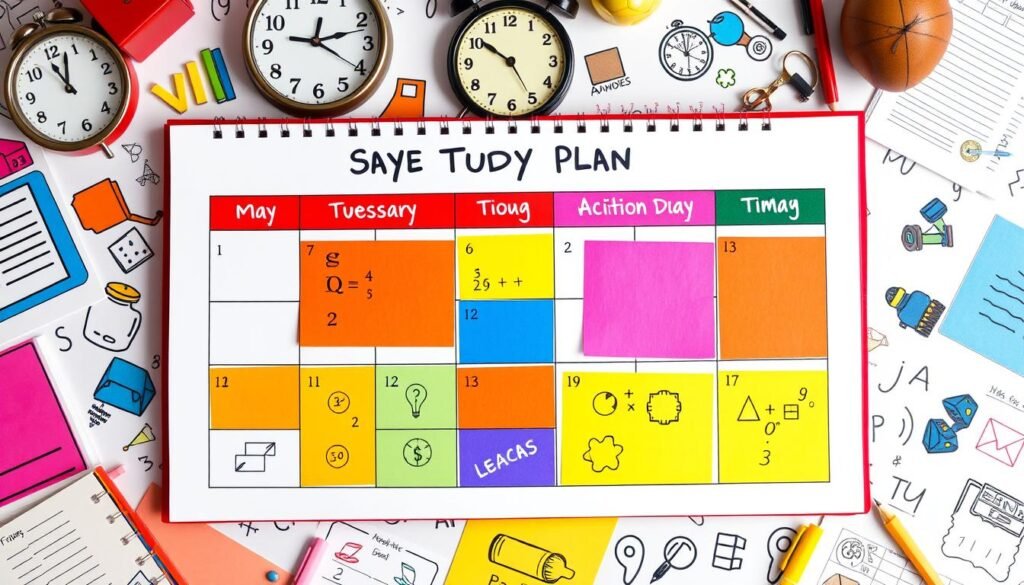Effective Time Management For Exams can be tough, with 88% of students finding it hard to manage their time. Also, 58% say they can’t finish exams on time. This guide offers strategies to help you do better in exams and manage your time well.
Also Read: Best Study Tips For Final Exams – Ultimate Guide
Key Takeaways
- Make a study plan that fits you and focus on hard topics first.
- Make sure to eat and sleep enough to stay focused and energized.
- Use smart ways to read questions and plan answers to save time.
- Use the last 15-20 minutes to check your answers and make sure you’ve answered all questions.
- Stay positive and believe in yourself to do well, even when time is tight.
Understanding the Importance of Time Management in Exam Success
Time management is key for students to do well in exams. Up to 88% of students have trouble managing their time during exams. This can cause them to miss out on answers, misunderstand questions, and get lower scores.
Also Read: The Basics Of International Trade Law For Beginners
Learning to manage time well is very important. It helps students do better in exams, feel less stressed, and be more confident. By making study plans, thinking about exam strategies, and practicing under exam conditions, students can get better at exams.
The Impact of Poor Time Management on Exam Performance
Students who can’t manage their time well often rush through exams. This can lead to mistakes and not understanding questions. It also makes them feel more stressed and anxious, which can make it harder to do well.
The Benefits of Mastering Time Management Skills
- Improved exam performance and higher scores
- Reduced stress and anxiety during the exam
- Increased confidence and focus
- Better retention of study material and understanding of concepts
- Development of essential life skills, such as prioritization and discipline
By using good time management, students can reach their full potential. They can do better in school and achieve more.
Pre-Exam Planning and Preparation Strategies

Effective time management is key to doing well on exams. Start by making a detailed study schedule. Spend more time on hard topics that need extra practice. Don’t forget to include time for revision, self-care, and rest to stay focused and energized.
Also Read: Easy Tips For Understanding Cybersecurity Law
It’s important to know the exam format, question types, and how points are scored. Practice with mock test papers to get a feel for the exam. This also helps you manage your time better by practicing under exam conditions.
- Create a detailed study schedule that allocates time for difficult topics, revision, and self-care.
- Solve practice tests to become familiar with the exam format, question patterns, and marking scheme.
- Practice writing answers neatly and solving full question papers under exam-like conditions.
- Develop a calendar with upcoming deadlines, exams, and social events to stay organized and avoid surprises.
| Technique | Benefits |
|---|---|
| Spaced Study Sessions | Improved understanding, retention, problem-solving, and knowledge application |
| Interleaving Study Topics | Enhanced memory and long-term learning outcomes |
| Mnemonics and Concept Association | Quicker recall of information, particularly for lists and multi-step processes |
| Pomodoro Technique | Increased focus during study time |
| Timed Writing Practice | Improved quick writing and clear thinking skills |
Using these strategies can improve your time management and boost your chances of success. It also helps reduce stress during the exam period.
Also Read: Why Mock Exams For Practice Are Essential For Success?
Effective Time Management For Exams

Doing well in exams depends a lot on how you manage your time. By planning your approach to exam questions, you can boost your chances of getting great grades. Let’s look at some key strategies for managing your time during exams.
Reading and Understanding Question Papers
Begin by reading and getting the whole question paper in the first 5-10 minutes. This quick look helps you make a plan and decide which questions to tackle first.
Strategic Question Prioritization
After understanding the questions, it’s time to pick which ones to do first. Start with the questions you’re most sure about. This way, you can build your confidence as you go.
Also Read: Top Study Strategies For Exams Success
Time Allocation Techniques
Plan your time based on how each question is marked. Save the last 15-20 minutes for checking your work. Do the easier questions first to get quick marks and then move on to the harder ones. Also, ask for extra answer sheets early to avoid delays.
Before you submit, take a moment to review your answers. Make sure you haven’t missed any questions and that your answers are correct. This last check can really improve your exam score.
By learning these time management tips, you can feel more confident in exams. Focus on the right questions, manage your time well, and double-check your work. These steps will help you succeed in any exam.
Five-Day Study Plan Implementation

Getting ready for exams needs a smart plan for managing time. The five-day study plan is a great way to avoid cramming at the last minute.
This plan breaks down study material into smaller parts. Students spend about 2 hours each day studying before the exam. It makes studying less stressful and helps them remember better.
- Day 1: Spend 2 hours on the first chunk, then review for 15 minutes.
- Day 2: Work on the second chunk for 2 hours and review the first for 30 minutes.
- Day 3: Focus on the third chunk for 2 hours and review the first two for 45 minutes.
- Day 4: Use 2 hours for the fourth chunk and review the first three for 1 hour.
- Day 5: Review all four chunks for 2 hours to solidify your knowledge.
This method helps students avoid cramming. Cramming can hurt long-term learning and increase stress. By reviewing material bit by bit, students retain information better and feel more ready for the exam.
“Careful review of all assigned material leads to less stress on exam day and better recall and performance.”
The plan also suggests making study aids like flashcards and practice questions. These tools help students understand and focus on weak areas.
By sticking to a five-day study plan, students can prepare better for exams. They boost their chances of success and dodge the pitfalls of cramming.
Tools and Resources for Time Management Success

Effective time management is key for exam success. The right tools and resources can greatly help. Options include digital calendars, study planning apps, and time tracking tools. These tools help students manage their time better and increase productivity.
Digital Calendar Solutions
Digital calendars like Google Calendar, Outlook Calendar, Fantastical, and Calendly are great for planning. They let students organize their study schedule and set reminders. This keeps them on track.
Study Planning Applications
For daily tasks, apps like Asana, Trello, and Structured app are very helpful. They help students break down their study into steps. This makes it easier to stay focused on their goals.
Time Tracking Tools
Physical planners and digital tools like Papier, Plum Paper, and Moleskine are also useful. For digital notes, Notion and Evernote are great options. They help keep everything organized.
Try out different digital calendars, study apps, and time management tools to see what works best for you. The right tools can make a big difference in your study efficiency and organization.
Also Read: Top Study Strategies For Exams Success
Conclusion
Effective time management is key to doing well on exams. By making detailed study plans and focusing on what’s most important, you can do better in school. It also helps you feel less stressed about exams.
Being kind to yourself and adding extra time to your schedule is important. Also, don’t hesitate to ask for help from friends or teachers when you need it.
Learning to manage your time well is not just for exams. It helps you stay focused, get more done, and feel more accomplished. You’ll have more time for fun activities and spending time with loved ones.
Good time management is a skill employers value a lot. By using the tips from this guide, you can get better at managing your time. This will help you succeed in school and prepare you for your future career.
Start working on your time management skills today. It will help you do well on exams and open up many opportunities for you in the future.
FAQs
Q: What are some effective time management tips for exams?
A: Some effective time management tips for exams include creating a study schedule, prioritizing topics based on difficulty, practicing past papers, and ensuring you have enough time to revise each section thoroughly.
Q: How can I ensure I complete the entire question paper on time?
A: To ensure you complete the entire question paper on time, divide your available time by the number of sections and allot a specific time limit for each section. This helps you stay on track and avoid wastage of time.
Q: What should I do if I encounter difficult questions during the exam?
A: If you encounter difficult questions, it’s best to remain calm and move on to the questions you know first. This way, you can maximize your score and return to the more challenging questions later if you have extra time.
Q: How can I effectively manage my reading time before starting to write?
A: To effectively manage your reading time, take a few minutes to familiarize yourself with the entire question paper. This will help you strategize which questions to attempt first and how to allocate your time accordingly.
Q: What is the impact of time management on exam performance?
A: Effective time management can significantly impact your performance. It allows you to allocate your time wisely, ensuring you can attempt all sections and revise your answers, which can lead to a better overall score.
Q: How should I dedicate my time towards the end of the exam?
A: Towards the end of the exam, dedicate your time to revising your answers, checking for any errors, and ensuring you have attempted all questions. If you finish early, use any extra time to re-write or improve your responses.
Q: Can I request an extra sheet if I run out of space while writing my answers?
A: Yes, if you run out of space, you can request an extra sheet from the invigilator. Make sure to indicate clearly that you need an additional sheet to avoid any confusion.
Q: What strategies can I use to calm my nerves during the exam?
A: To calm your nerves during the exam, take deep breaths, maintain a positive mindset, and remind yourself of the preparation you’ve done. Staying calm can help improve your focus and performance.
Q: How can I effectively revise concepts and theories before the exam?
A: To effectively revise concepts and theories, create concise notes, use flashcards, and practice explaining the material out loud. This active engagement with the material can enhance retention and understanding.
Q: Why is it crucial to manage time efficiently during essay questions?
A: It is crucial to manage time efficiently during essay questions because they often require more in-depth responses. By allotting enough time for planning, writing, and revising, you can ensure that your essays are complete and well-structured, which can positively affect your overall grade.
Source Links
- https://www.allenoverseas.com/blog/effective-time-management-how-to-manage-time-during-exams/
- https://www.oxford-royale.com/articles/managing-time-exam/
- https://www.skvgwalior.org/blog/time-management-for-exam-preparation/
- https://www.alphaacademy.org/importance-of-time-management-during-exams/
- https://usq.pressbooks.pub/academicsuccess/chapter/exams-and-alternative-assessments/
- https://weekplan.net/efficient-time-management-during-exams
- https://assess.com/strategies-for-test-preparation/
- https://studentexperience.uwo.ca/remote/docs/Wellness-Content.-Time-Management-for-Exams.pdf
- https://online.marquette.edu/business/blog/effective-time-management-for-students-and-professionals
- https://studentreadiness.ecu.edu/m3-lifestyle/time-management/
- https://uta.pressbooks.pub/nursingschoolsuccess/chapter/3-4-reviewing-material/
- https://open.maricopa.edu/nursingstudentsuccess/chapter/preparing-for-an-exam/
- https://www.vu.edu.au/about-vu/news-events/study-space/how-to-make-an-effective-study-plan
- https://summer.harvard.edu/blog/8-time-management-tips-for-students/
- https://www.usa.edu/blog/time-management-techniques/
- https://extension.uga.edu/publications/detail.html?number=C1042&title=time-management-10-strategies-for-better-time-management
- https://www.simplilearn.com/tutorials/time-management-tutorial/best-time-management-tips-for-students
- https://www.acc.edu.au/blog/time-management-skills-student-learning/





